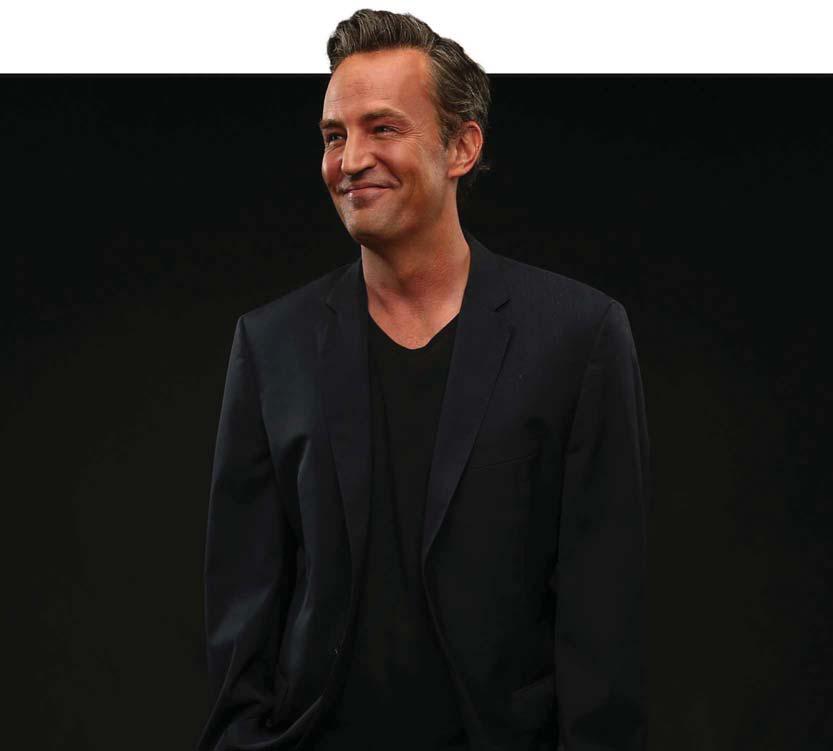
When the news broke of the tragic passing on 28 October of the comedy actor, and everyone’s sarcastic favourite in Friends, Matthew Perry (right), the tributes didn’t focus solely on his talents for making people laugh. Featured prominently in the obituaries were his struggles with mental health and addictions to alcohol and painkillers, something the man himself would undoubtedly have approved of given his openness on the subject.
Perry wasn’t unique in this. Many comedy icons – Robin Williams and Spike Milligan spring most easily to mind – are well known for their mental health struggles.
Such talents lend themselves to the ‘tears of a clown’ cliché, a concept best illustrated by the old punchline delivered when a depressed patient goes to see a doctor. The physician advises them to go and see the famous clown Pagliacci to lighten their spirits, only for the patient to burst into tears and reply: “But Doctor, I am Pagliacci.”
Why would people so gifted at making others laugh be prone to struggle with their own happiness? Some surprisingly logical explanations can be offered by the workings of the human brain.
Humans are extremely social creatures: our brains experience pleasure when others approve of us, and pain if we’re rejected socially. A low social status is reliably linked to mental health issues, like depression and anxiety.
هذه القصة مأخوذة من طبعة December 2023 من BBC Science Focus.
ابدأ النسخة التجريبية المجانية من Magzter GOLD لمدة 7 أيام للوصول إلى آلاف القصص المتميزة المنسقة وأكثر من 9,000 مجلة وصحيفة.
بالفعل مشترك ? تسجيل الدخول
هذه القصة مأخوذة من طبعة December 2023 من BBC Science Focus.
ابدأ النسخة التجريبية المجانية من Magzter GOLD لمدة 7 أيام للوصول إلى آلاف القصص المتميزة المنسقة وأكثر من 9,000 مجلة وصحيفة.
بالفعل مشترك? تسجيل الدخول

THE WORST IDEAS OF THE 21ST CENTURY
NOT ALL IDEAS CAN BE HITS. ALONGSIDE GROUND-BREAKING INNOVATIONS, 21ST-CENTURY SCIENTISTS HAVE HELMED THEIR SHARE OF WILD TECH FLOPS, DUBIOUS THEORIES AND OVERHYPED BREAKTHROUGHS. HERE ARE THE BIGGEST TO FORGET

10 IDEAS THAT WILL SHAPE YOUR NEXT 25 YEARS
Predicting the future is considered a fool's game. But it's one many of us like to play.

THE BIGGEST BREAKTHROUGHS OF THE CENTURY
We're a quarter of the way into the new century. To mark this milestone, we asked the UK's top minds to highlight some of the game-changing scientific breakthroughs shaping our world since the year 2000

DO THE SCIENCE COGNITIVE SHUFFLE
Trouble sleeping? A lot on your mind? Use this trick and sedate your synapses

WHAT DETERMINES HOW MANY ABS I CAN GET?
Assuming you're a human being, you have exactly the same number of abs as everybody else: two.

HOW CAN I IDENTIFY MY PSYCHOLOGICAL BLIND SPOT?
In the 1950s two American psychologists, Joseph Luft and Harrington Ingham, proposed a way of thinking about psychological blind spots - things you don't know about yourself - that they called the 'Johari Window' (the term is a combination of their first names).

How can I change my personality?
Want to become more confident, extroverted or assertive? Science shows that with a few simple changes, you can unlock your best self

Could your cosmetics be harming your health?
Cosmetic companies are phasing out microplastics and so-called 'forever chemicals' to help protect consumers.

extraterrestrial US Congress is talking about activity again. Is the truth really out there?
Despite several testimonies, the question remains frustratingly unanswered

Map of 100 million human body cells revealed
Over three dozen new studies mark significant milestone towards complete Human Cell Atlas